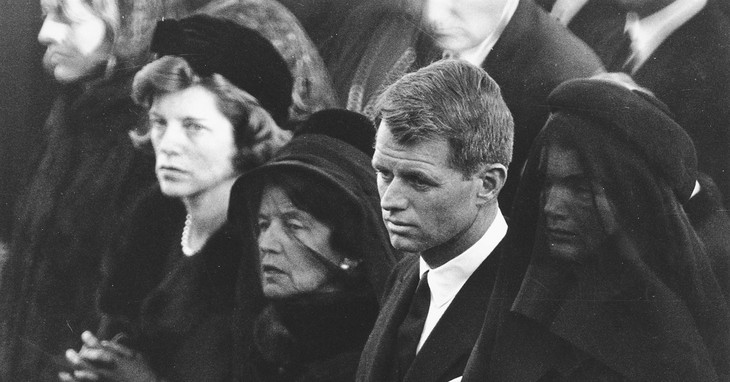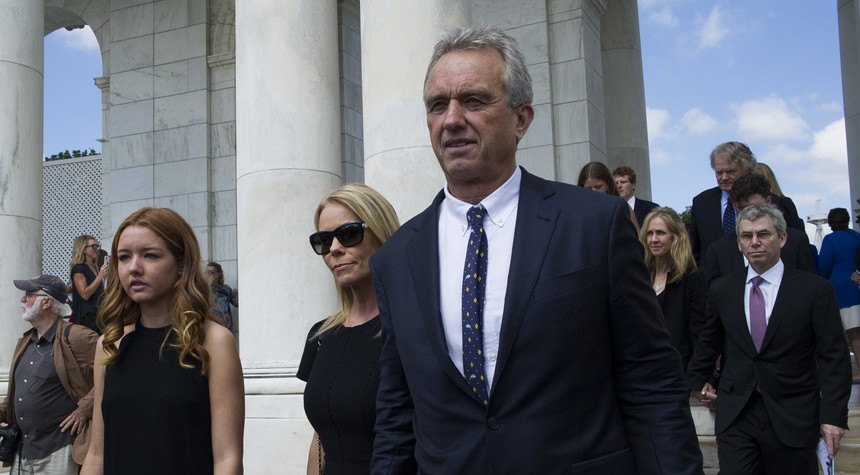WATCH: Dem Presidential Candidate RFK Jr. Tells Joe Rogan He Has to 'Be Careful' so the CIA Doesn't Assassinate Him
Democratic presidential candidate Robert F. Kennedy, Jr. (RFK Jr.) recently voiced his concerns about the CIA if he were to be elected president. In a conversation with comedian and popular podcast host Joe Rogan, Kennedy drew parallels between his own safety and the alleged involvement of the CIA in the assassination of his uncle, President John F. Kennedy. He stated:
I gotta be careful. I’m aware of that danger. I don’t live in fear of it at all. But, I’m not stupid about it and I take precautions.
Kennedy expressed his belief that his uncle was “at war with his military and intelligence apparatus” during President JFK’s tenure and that the agencies were trying to manipulate the late president into deploying troops to countries such as Cuba and Vietnam. Kennedy suggested that his uncle had grown frustrated with the CIA after the Bay of Pigs incident and desired to dismantle the agency, remarking:
He wanted to shatter the CIA. He wanted to scatter it to the winds.
Kennedy said JFK’s anti-war stance was at odds with the purpose of the Washington war network, saying:
My uncle John Kennedy, you know did that, he refused to go to war. He was surrounded by a military-industrial complex -and he learned very early- and an intelligence apparatus, he realized early on that the purpose of the CIA and the intelligence apparatus was to create a constant pipeline of new wars for the military-industrial complex.
These statements shed light on the complex dynamics within the U.S. government during John F. Kennedy’s presidency and raise questions about the extent of influence and power held by intelligence agencies. The CIA has not responded to requests for comment thus far.
Kennedy recalled President Eisenhower’s famed warning, just days ahead of his uncle’s inauguration, saying:
Three days before he took the oath of office, Eisenhower who was the outgoing president gave what is probably what is the most important speech in American history where he warned against the military-industrial complex.
Kennedy also linked his late uncle, President John F. Kennedy’s tragic assassination with his actions of pulling troops from Vietnam, saying:
In October of 1963, he heard that some of his Green Berets had been killed over there. And, he said, ‘I want a total casualty list from Vietnam,’ and his aide came to him and said, ’75 Americans have died.’ He said, ‘That’s too many.’ He signed, that day, a national security order, ordering all troops out of Vietnam -U.S. troops- the first thousand over the next month and then the rest by the beginning of 1965. And then, a month later, he was killed.

The Democratic presidential candidate, RFK Jr., is, of course, named after his father, Robert F. Kennedy, commonly known as Bobby Kennedy. Bobby served in his brother’s administration as the attorney general and later represented New York in the U.S. Senate. But, as his namesake son is currently endeavoring, Bobby Kennedy ran for president, too.
On June 4, 1968, Bobby Kennedy won the California Democratic presidential primary, notably running on an anti-war platform. The following day, Bobby Kennedy was fatally shot at the Ambassador Hotel in Los Angeles, shortly after delivering a victory speech. Kennedy was murdered by Sirhan Sirhan, a 24-year-old Palestinian Arab. Kennedy was rushed to the hospital but succumbed to his injuries the following day, on June 6, 1968. His death deeply shocked the nation and led to an outpouring of grief and mourning, with the assassinations of both his brother, JFK, and Martin Luther King Jr. still fresh in the public’s consciousness. The motive behind the assassination remains a subject of debate and speculation.
Read More:
VIP: The Democrats’ RFK Jr. Problem
RFK Jr.: ‘Overwhelming’ Evidence That CIA Was Behind JFK Assassination
While RFK Jr. holds a distant second place among Democratic candidates, his polling numbers and growing support have sparked discussions about the potential impact he could have on the election. There is speculation that his presence in the race could potentially lead to a third-party challenger who might divert votes away from incumbent Joe Biden, who is widely expected to secure the nomination. The absence of Democratic Party primary debates due to having an incumbent president running further adds to the uncertainty surrounding the race, while recent polling shows Kennedy outperforms Biden in favorability.
Kennedy’s concerns about the CIA may be rooted in personal experiences and historical events, but their significance in the current political landscape, including a large swath of Americans believing federal agencies are being weaponized domestically, is yet to be fully understood. The reactions and responses from both the public and official sources will likely shape the narrative surrounding Kennedy’s candidacy and its potential implications for the wider political arena.
Watch the exchange between Kennedy and Rogan below:





Post a Comment